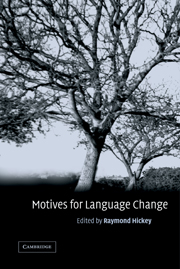Book contents
- Frontmatter
- Contents
- Notes on the contributors
- Acknowledgements
- Introduction
- Part I The phenomenon of language change
- Part II Linguistic models and language change
- Part III Grammaticalisation
- Part IV The social context for language change
- Part V Contact-based explanations
- Part VI The typological perspective
- Index
- References
Introduction
Published online by Cambridge University Press: 22 September 2009
- Frontmatter
- Contents
- Notes on the contributors
- Acknowledgements
- Introduction
- Part I The phenomenon of language change
- Part II Linguistic models and language change
- Part III Grammaticalisation
- Part IV The social context for language change
- Part V Contact-based explanations
- Part VI The typological perspective
- Index
- References
Summary
A cursory glance at recently published books on linguistics shows that the theme of language change is as much an object of interest among linguists as it has ever been. In the history of the discipline the main concern has been with language reconstruction, in the classical Neogrammarian sense, and this achieved its clearest theoretical statement in Herman Paul (1975 [1880]). The nineteenth-century concern with the gradual and wholesale mutation of sound systems was to lead to dissatisfaction at the beginning of the twentieth century. With the establishment of the structuralist paradigm, first in Europe and then in America, the synchronic perspective dominated. The structuralist paradigm of the first half of the twentieth century was important in that it led to a shift in focus from phonology and morphology, typical of Indo-European studies, to encompass other levels of language. However, despite the theoretical reorientation introduced by Chomsky in the late 1950s, the majority of linguistic discussions were based on data from present-day languages. In the late 1960s the application of generative grammar to concerns in historical linguistics was heralded by Robert King's 1969 monograph on the subject. In the 1970s much activity arose in connection with diachronic syntax (Li 1975, 1977; Lightfoot 1979; see also Fischer, van Kemenade, Koopman and van der Wurff 2000 as well as Pintzuk, Tsoulas and Warner 2001).
- Type
- Chapter
- Information
- Motives for Language Change , pp. 1 - 4Publisher: Cambridge University PressPrint publication year: 2003
References
- 1
- Cited by



